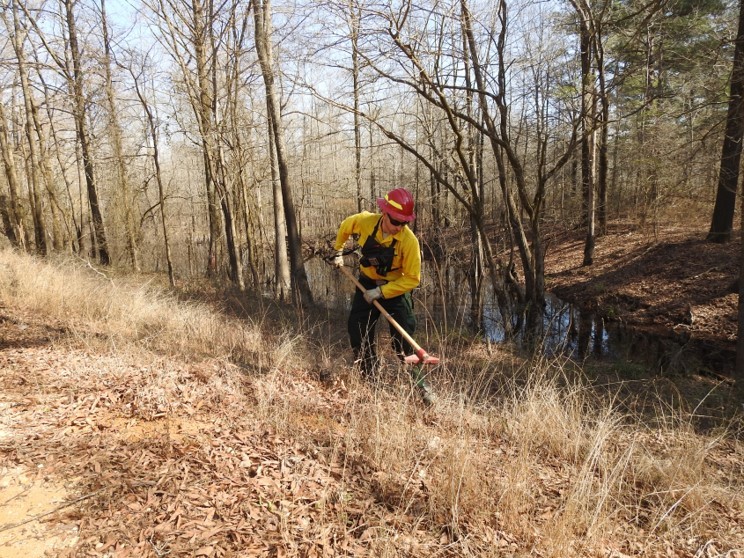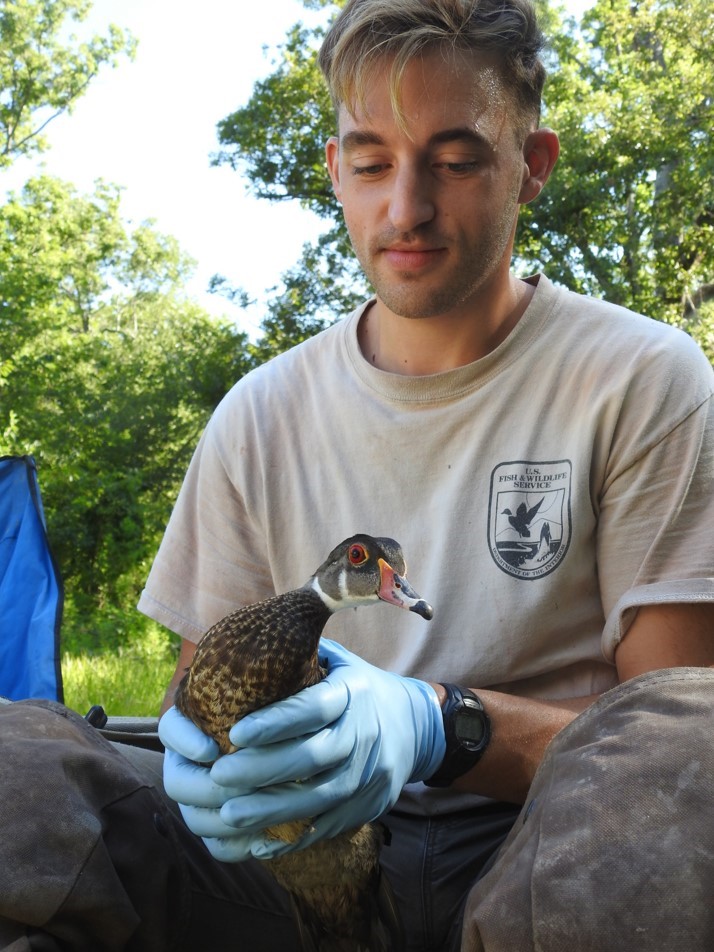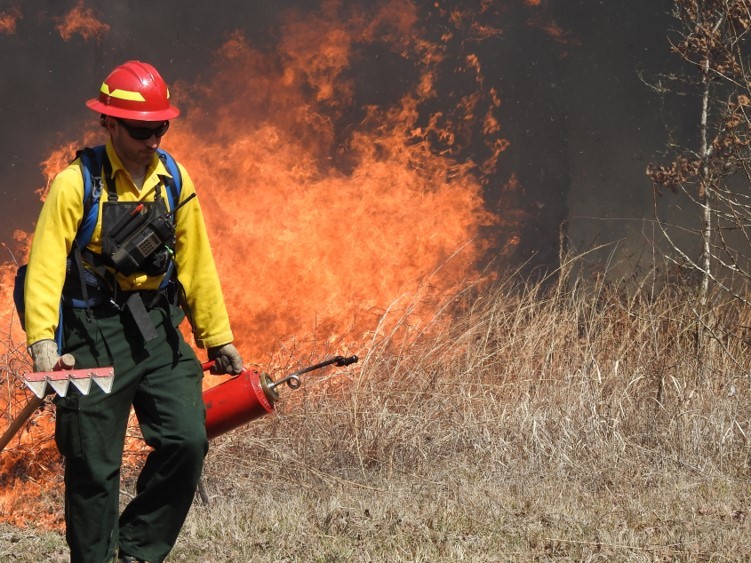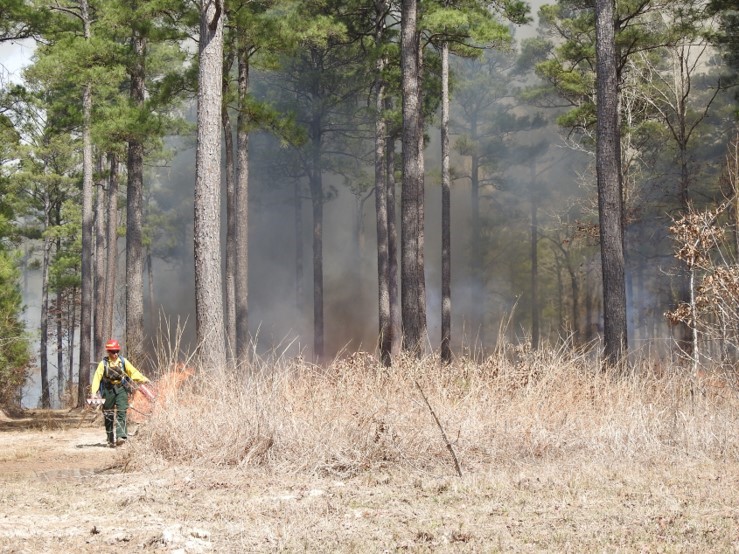The Corps Network recently became approved as a certifying organization for the Presidential Volunteer Service Award (PVSA). PVSA’s go to individuals who have served over 4,000 service hours over the individual’s lifetime. The Corps Network can distribute awards to member Corps who are in good standing and at the affiliate level or higher. The recipient must have at least 25% of their service hours with the organization. See requirements here.
Kyle Dash, a former member of American Conservation Experience (ACE), was the first individual that TCN awarded the PVSA. He served his 4,000 hours with AmeriCorps NCCC, and ACE, who nominated him for the award. He currently works as a wildland firefighter in North Carolina.
Q: Tell us a bit about your background, how did you find ACE?
I grew up in this small town called Moretown. It’s located about 20-30 minutes away from Montpelier in Vermont. I graduated from a four-year College in Vermont called Castleton University, where I got my Bachelors in Ecological Studies. I came about the ACE program when I did a term of service with AmeriCorps NCCC.
I was doing some career exploration towards the end of my term of service, and I saw that ACE offered internships with different federal agencies and I thought to try to apply to some of them. I was at ACE as a Forestry and Prescribed Fire intern.
Some hobbies I like to do are hiking, biking, reading, and playing the piano.

Service Term with ACE
Q: Where did you serve with ACE?
I served primarily in Southern Arkansas as part of the Southern Arkansas Refuge Complex, which consisted of three wildlife refuges. You have the Felsenthal National Wildlife Refuge, which is more southern central and then you have Pond Creek, which is bordering Texas, and then you have the Overflow National Wildlife Refuge, which is more to the east, almost close to Mississippi.
Q: Tell us about your experience with ACE, what were some of the projects that you worked on?
I served with ACE from October 2021 to November 2022. When I first started my ACE internship, there wasn’t really a whole lot going on because it was the fall and winter seasons, and hunting was going on then, so not a lot of outdoor activity was happening. I got a chance to help run deer check stations where they checked for chronic wasting disease, and gathered data on the age and sex of deer to help monitor populations in Arkansas.
Other cool things that I got to do were biological surveys for fish and birds, particularly wetland bird species at Overflow because they have a bunch of impoundments where they manage a lot of habitats for waterfowl and marsh and duck hunting.
I did some vegetation surveys for timber stands. I got to be on the ground and did some prescribed burns on some of the refuges – which is cool, and then just did some ArcGIS and GIS mapping for different resources and miscellaneous tasks.
Q: What skills do you think you gained throughout the program?
I was able to get ATV and UTV certified. I got to learn how to drive and operate a tractor. I had many opportunities to practice doing animal and plant ID-ing. I did a bit of prescribed fire. I also got a chance to travel to Barksdale Air Force Base where they have a U.S. Fish and Wildlife Service program on the base where they do some burning as well. And then I got to renew my wildland firefighter’s certs and renewed my first aid.
I was able to talk to a lot of the full-time employees at the refuge I was stationed at which was the Felsenthal National Wildlife Refuge. Some of the pieces of advice that I got from one of the employees who was the refuge manager was to just get used to getting comfortable with being uncomfortable because there’s a lot of instances where you may be doing one thing and then the next day, you’re doing something completely different.

Q: What do you think you learned about yourself?
I learned to put myself up front more and engage more with the other interns that were there and other employees be like, “Hey, I have this idea. Do you think this would work or do you think this idea does not work?”
Also keeping my work life and my personal life separate to prevent workers’ burnout, and to manage my time better.
Q: What was your average day at ACE like?
The average day for me would be to start work around six or seven in the morning, log in on my work computer, and check my email.
Sometimes I would have to wake up and leave the work center by three or four in the morning to go do some surveys for birds because some sites were farther away than others, and I had to have enough time to be at those sites before sunrise.
Usually, I’d go out and try to help with doing any surveys. If there was no biology surveys that needed to be done, it would be beaver dam removal, helping to mark timber to be harvested, or helping to take inventory of what refuge boundaries need to be repainted or resigned. So just wide variety of different things. Every day could be different.
Q: What was the most rewarding/ beneficial part of the program?
I think one of the best things about being an intern and working with the U.S. Fish and Wildlife Service or I guess any federal agency is that you get to see a lot of the areas that the public necessarily don’t see. And so, it’s kind of a special treat to see different wildlife, different habitat types, usually stuff that is off the beaten path.
I also think the Segal Education Award at the end that I used to help pay one of my student loans was beneficial.
Since I worked with the U.S. Fish and Wildlife Service, I was able to receive a Public Land Corps certificate which can help me apply for federal jobs. It helps employers see that I have experience working with the U.S. Fish and Wildlife Service, and know how they operate.

Looking Forward
Q: What are you doing now?
I’m currently employed as a wildland firefighter with the U.S. Forest Service in North Carolina. Currently my goals are to gain more experience and skill skills in running a type-six fire engine.
Q: What advice would you give someone looking to join a Corps?
Some pieces of advice I would give if someone wanted to join a program like ACE or do service in general is… just knowing your limits and knowing your boundaries.
Know your worth. Stick up for yourself. Know what you’re okay with doing, what you’re not okay with doing. If you have questions about something you’re not sure of, ask questions. It’s better to ask questions sooner than later. But also, don’t let your fears get in the way. As I said earlier, get comfortable with being uncomfortable.Interact with other interns, other people, employees, get to know them, ask them lots of questions.
Q: How did you feel about receiving the Presidential Volunteer Service Award?
It felt good knowing I helped a lot of people and organizations with their missions and their goals.






































































